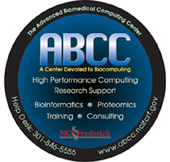
About ABCC
The National Cancer Institute's supercomputing facility is a fully integrated, high performance, high capacity, scientific computing resource for biomedical research. The ABCC is located at the NCI-Frederick campus in Frederick, MD. Organizationally identified as the Advanced Biomedical Computing Center (ABCC), the facility provides state-of-the-art computing support and technology to the scientists of the National Cancer Institute (NCI), National Institutes of Health (NIH), other federal agencies, and extramural biomedical researchers.Mission Statement
The Advanced Biomedical Computing Center (ABCC) provides a state-of-the-art high performance, high capacity computing environment for the solution of data intensive computational biological problems. The ABCC offers a broad spectrum of computer architectures, software packages, and consulting expertise in many areas of biological research. The ABCC provides HPC support, collaborative research, training, and conducts in-house research in various areas of computational biology and biomedical reasearch. The overall mission of the ABCC is to provide cutting edge tools to (NCI)/ (NIH) scientists, other federal agencies, and extramural biomedical researchers.ABCC Information/User Accounts
For more information on obtaining an account, technical support of training seminars, contact the ABCC Helpdesk at(301) 846-5555 or helpuser@ncifcrf.gov.
For additional information, contact Vadim Sapiro, Director of Information Systems, at (301) 846-5763 or sapirov@mail.nih.gov.
Software
- Sequence Analysis (GCG, Blast, Look, Phylip, Staden and others)
- Databases (MPSearch, Entrez, Cambridge (CSD), Protein (PDB) and Beilstein)
- Computational Chemistry (Gaussian 94, Gamess, UniChem, AMBER, Discover, Charmm and others)
- Molecular Modeling and Visualization (Insight, Quanta, ChemX, MidasPlus, Sybyl and others)
- Crystallography (Xplor, Xtalview, ProCheck, O and others)
Computational Resources
Technical Support
Data Storage/Archival




